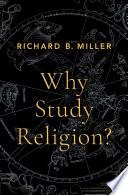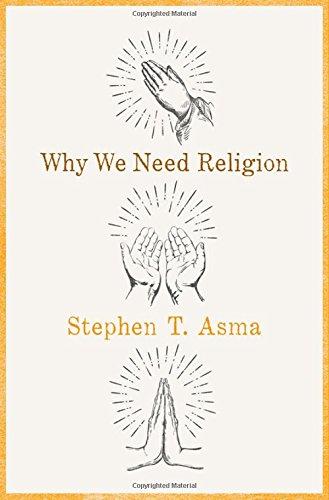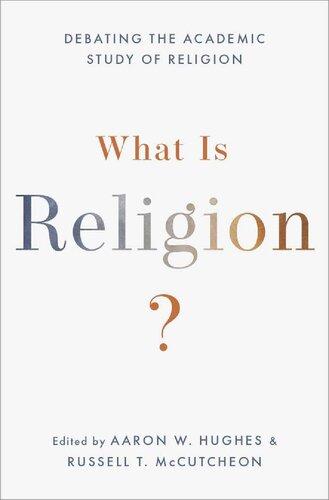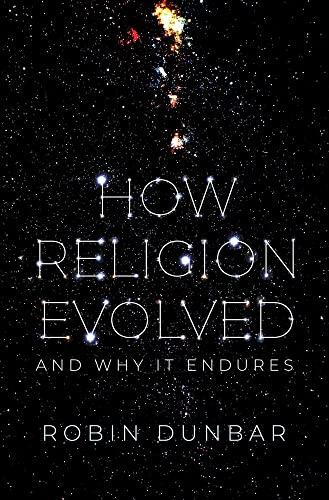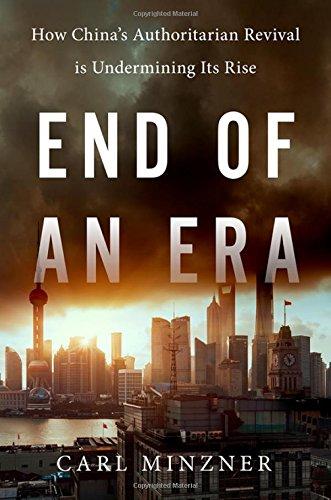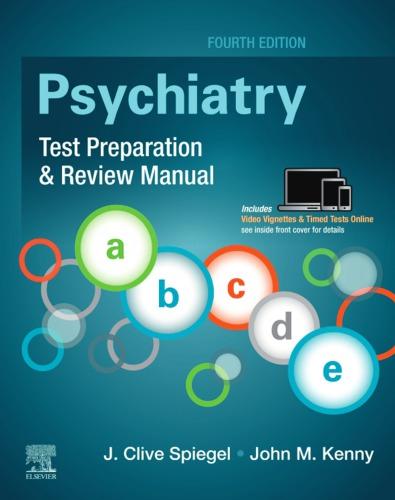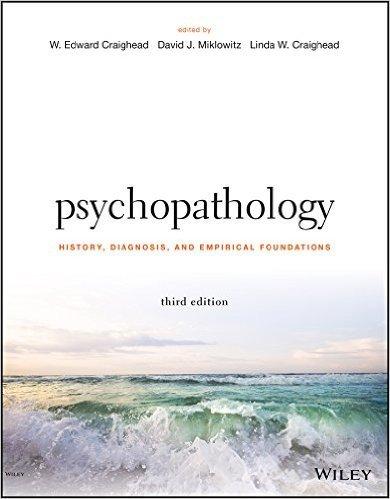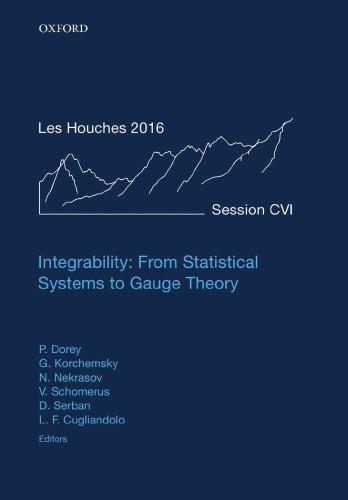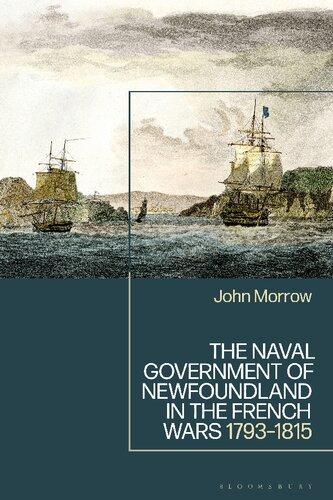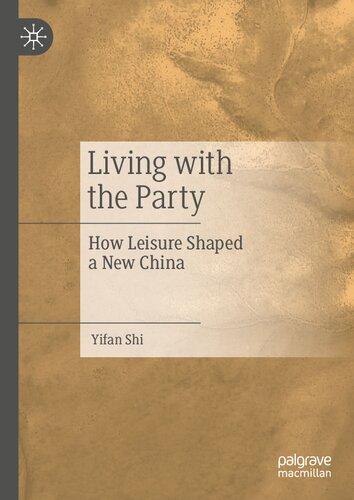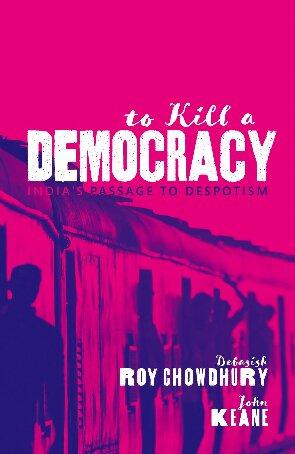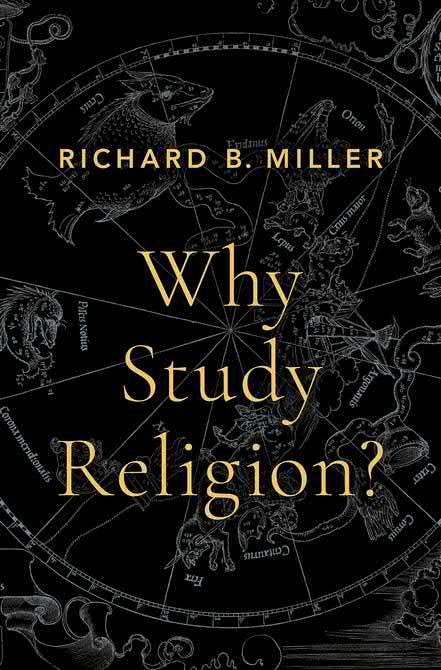Why Study Religion?
RICHARD B. MILLER
3
Oxford University Press is a department of the University of Oxford. It furthers the University’s objective of excellence in research, scholarship, and education by publishing worldwide. Oxford is a registered trade mark of Oxford University Press in the UK and certain other countries.
Published in the United States of America by Oxford University Press 198 Madison Avenue, New York, NY 10016, United States of America.
© Oxford University Press 2021
All rights reserved. No part of this publication may be reproduced, stored in a retrieval system, or transmitted, in any form or by any means, without the prior permission in writing of Oxford University Press, or as expressly permitted by law, by license, or under terms agreed with the appropriate reproduction rights organization. Inquiries concerning reproduction outside the scope of the above should be sent to the Rights Department, Oxford University Press, at the address above.
You must not circulate this work in any other form and you must impose this same condition on any acquirer.
Library of Congress Cataloging-in-Publication Data
Names: Miller, Richard Brian, 1953– author.
Title: Why study religion? / Richard B. Miller, University of Chicago. Description: New York, NY, United States of America : Oxford University Press, 2021. | Includes bibliographical references and index.
Identifiers: LCCN 2021035214 (print) | LCCN 2021035215 (ebook) | ISBN 9780197566817 | ISBN 9780197566831 (epub) | ISBN 9780197566824 | ISBN 9780197566848
Subjects: LCSH: Religion—Methodology. | Religion—Study and teaching. Classification: LCC BL41 .M545 2021 (print) | LCC BL41 (ebook) | DDC 200.71—dc23
LC record available at https://lccn.loc.gov/2021035214
LC ebook record available at https://lccn.loc.gov/2021035215
DOI: 10.1093/oso/9780197566817.001.0001
1 3 5 7 9 8 6 4 2
Printed by Sheridan Books, Inc., United States of America
To humanistic intellectuals in the study of religion—and beyond.
Today there are plenty of modest and worthy laborers among scholars, too, who are happy in their little nooks; and because they are happy there, they sometimes demand rather immodestly that one ought to be content with things today, generally—especially in the domain of science, where so much that is useful remains to be done. I am not denying that; the last thing I want is to destroy the pleasure these honest workers take in their craft: for I approve of their work. But that one works rigorously in the sciences and that there are contented workers certainly does not prove that science as a whole possesses a goal, a will, an ideal, or the passion of a great faith.
Friedrich Nietzsche, On the Genealogy of Morals
One of the many curious facts about academic life in America is that very few people who work in the humanities ever think about them.
Geoffrey Galt Harpham, The Humanities and the Dream of America
We should not try to define “the humanities” by asking what the humanities departments share which distinguishes them from the rest of the university. The interesting divide is, instead, one that cuts across departments and disciplinary matrices. It divides people busy conforming to well-understood criteria for making contributions to knowledge from people trying to expand their own moral imaginations. These latter people read books in order to enlarge their sense of what is possible and important—either for themselves as individuals or for their society. Call these people “humanistic intellectuals.” One often finds more such people in the anthropology department than in the classics department, and sometimes more in the law school than in the philosophy department. . . . When they apply for a leave or a grant, they may have to fill out forms about the aims and methods of their so-called research projects, but all they really want to do is read a lot more books in the hope of becoming a different sort of person.
Richard Rorty, Philosophy and Social Hope
Acknowledgments ix
I. A CRISIS OF RATIONALE
1. On Justifying the Study of Religion 3
2. The Ethics of Religious Studies 18
II. A REGIME OF TRUTH
3. Interpretation, Comparison, and the History of Religions: On the historian of religion, Jonathan Z. Smith 45
4. Scientific Rationality and Causal Explanation: On the naturalism of Donald Wiebe 71
5. Existential Symbolism and Theological Anthropology: On the Protestant theologian, Paul Tillich 95
6. Embodied Practice and Materialist Phenomenology: On the sociologist of religion, Manuel A. Vásquez 127
7. Genealogy, Ideology, and Critical Theory: On Russell T. McCutcheon, Timothy Fitzgerald, and Saba Mahmood 147
8. Philosophy, Normativity, and Metacriticism: On the philosophers of religion, Stephen S. Bush and Kevin Schilbrack 191
III. PURPOSES, DESIRES, AND CRITICAL HUMANISM
9. Religious Studies and the Values of Critical Humanism
1 On Justifying the Study of Religion
1.1. Fraternal Weberian Twins
Can the academic study of religion be justified? Should it be included in the curricula of higher education? Do good reasons exist that could motivate scholars to take up the study of religion as a profession?
These questions were fundamental to debates about developing the study of religion in American higher education during the 1960s and 1970s, but decades later they have yet to receive a convincing reply. In this book I will answer them in the affirmative and argue for that answer. Doing so requires us to see why scholars of religion actually deny themselves reasons for tackling these questions directly. Determining whether the academic study of religion can be justified, whether it belongs in college curricula, and whether reasons exist to motivate scholars to study religion means that we must resolve uncertainties in the guild about whether such questions can be answered.
To be sure, doubts about whether the academic study of religion is justified are not unique to scholars of religion. Nor are they new. In his 1917 lecture, “Science as a Vocation,” Max Weber asks whether disciplines in the modern university provide a basis for taking them up as a career. His answer, briefly stated, is that they cannot, and his reason sheds important light on the justificatory status of the study of religion.1 Science—by which Weber means not only the natural sciences but also the historical and cultural sciences—is unable to explain why its practitioners should enter the academy. In Weber’s diagnosis, modern science has become more specialized and continues to extend the reach of rational investigation into new, uncharted terrain. But the increasing specialization of scholarly inquiry cannot provide grounds for the academic pursuit of knowledge and address broader questions about value and existential commitment. Although scientists doubtless have their own subjective reasons for choosing their profession, they must remain staunchly value-neutral in their work to ensure reliable results in their research. Otherwise they impose value-laden commitments that bias what
Why Study Religion?. Richard B. Miller, Oxford University Press. © Oxford University Press 2021.
DOI: 10.1093/oso/9780197566817.003.0001
should be an objective point of view. According to Weber, research regarding the physical universe, as well as human values and religious traditions, must proceed in a disinterested way.2 He writes: “It is one thing to state facts, to determine the mathematical or logical relations or the internal structure of cultural values, while it is another thing to answer questions of the value of culture and the question of how one should act in the cultural community and in political associations. These are quite heterogeneous problems.” To the question why both types of problems should not be addressed together in the classroom he replies: “Because the prophet and the demagogue do not belong on the academic platform.”3
Thinking about premodern science helps sharpen Weber’s point. Previous reasons for practicing science—to know God’s design or to discover the basis for human happiness, for example—have fallen away as grounds for understanding science’s contribution to human knowledge because the universe is no longer seen as speaking to such matters. “The fate of our times,” Weber writes, “is characterized by rationalization and intellectualization and, above all, by the ‘disenchantment of the world.’ ”4 Modern science is thus now largely instrumental and utilitarian. It enables us to acquire greater mastery of the world, improves our methods for the training of thought, and adds clarity about how best to achieve our ends and give an account of our own subjective convictions.5 As Weber sees things, “science today is a ‘vocation’ organized in special disciplines in the service of self-clarification and knowledge of interrelated facts. It is not the gift of grace of seers and prophets dispensing sacred values and revelations, nor does it partake of the contemplation of sages and philosophers about the meaning of the universe.”6
To be sure, Weber grasps that science is not without its own presuppositions. The scientist “presupposes that the rules of logic and method are valid” and, for that matter, believes “that what is yielded by scientific work is important in that it is ‘worth being known.’ ” But herein lies the rub for Weber: this latter presupposition “cannot be proved by scientific means.”7 Science cannot speak to individuals who are considering whether to become scientists; instead, it must presume its own importance. Deciding to embark upon a profession is a value question to which science as a valueneutral enterprise declines to answer.
As a result, Weber concludes, modern science lacks reasons to account for itself or to motivate scholars to take it up as a career. Whatever reasons one might have for joining the academy would have to be subjective and idiosyncratic. Distinguishing between facts and values thereby urges upon scholars
a kind of epistemic abstinence toward ensuring that scientific research is carried out according to value-neutral procedures. Indeed, the commitment to value-neutrality is what Friedrich Nietzsche, a key influence on Weber, describes as an “ascetic ideal”: the aspiration to attain an impartial, disembodied, impersonal point of view, detached from one’s emotions, contexts, and desires.8 According to Nietzsche, the ascetic ideal articulates itself across a range of practices—art, medicine, psychology, and philosophy—in the effort to acquire a vantage point that rises above human mortality, finitude, and embodied desire. As a form of “intellectual stoicism,” it is the offspring of religious selflessness and self-denial, an exercise of self-abnegation that imposes on modern life expectations of impersonal and “unegoistic” knowledge of “the visible order of things.”9 Echoing these ideas, Weber insists that the academic conscience should be constrained by the imperative of disinterestedness, one that sharply distinguishes between fact and value, reason and emotion, impartial procedure and personal calling.
One of Weber’s signature claims, then, is that science should be an austere, dispassionate, value-neutral enterprise, requiring a hermeneutics of abstinence that is stripped of desires and commitments that would bias a scholar’s thought. “Whenever the man of science introduces his personal value judgments,” he insists, “a full understanding of the facts ceases.”10 Yet there is a second important idea in Weber’s lecture that can be easily missed, namely, the idea that science produces knowledge that is instrumental and utilitarian. By enabling us to acquire greater mastery of the world, he observes, science is increasingly tethered to economic, pragmatic, and occupational aims. The work of the modern scientist, on Weber’s description, provides fuel to the university as an engine of the economy. Weber thus connects two ideas to describe the ethos of the modern academy: value-neutrality and pragmatic utility. Ironically for Weber, value-neutrality is anything but value-neutral. It motivates a form of knowledge production about how to extend our control over the natural and social world and advance the promise of social progress and economic growth. Epistemic detachment and pragmatic utility are fraternal Weberian twins.
Much of the contemporary study of religion has internalized and normalized Weber’s heroic ideal. It generally conforms to his description of modern science insofar as it is an increasingly specialized discipline that aims to extend rational inquiry into new frontiers of culture, thought, and society in a dispassionate, value-neutral way. Like Weber’s view of science, it often presumes its own self-justification and, at the theoretical level, concentrates
on matters of research methodology. Although religions are saturated with values, Weber would urge scholars of religion to be value-neutral so as to ensure objective results in their work. And generally speaking, scholars of religion, especially theorists of religion, abide by Weber’s mandate. The idea is to insist upon studying religion in ways that are disinterested, free of normative interrogation and evaluation. Scholars can thus let religious practitioners (and their cultural documents) speak for themselves, from within their own contexts, and in their own languages—uncluttered by evaluative commentary by those who study them. If values do motivate a scholar’s work, they are often introduced as autobiographical and personal matters but not in ways that are intersubjectively proffered and defended within a space of reasons. Weber would quickly observe that scholars of religion, like other modern academics, thus find it hard to defend the value of their work or to commend it to present and future generations of students and potential specialists. It should come as no surprise, he would add, that they have tremendous difficulty saying why their work has merit and addressing the questions I identified at the outset of this chapter.11
1.2. An Overbearing Conscience
What a Weberian diagnosis might have us overlook, however, is a unique feature of the academic study of religion that renders a justificatory account even more difficult to provide. Religious studies is unusual because, unlike other disciplines, it has reasons to be wary about championing its merits. As I will discuss in chapter 2, the guild has grounds for being reluctant to account for itself—to justify itself—as important. That reluctance is not simply a function of the limits of carrying out science according to the requirements of dispassionate value-neutrality. It is also the function of principled concerns about self-justification. Scholars in the field may well refrain from commending the study of religion not merely because they think they must abide by the ascetic ideal but also because moral doubts exist about the very practice of justification itself. In religious studies there are reasons of conscience to remain reticent about the value of studying religion that are tied to reservations about being one’s own judge and jury.
Why Study Religion? aims to diagnose why the academic study of religion is unable and unwilling to justify itself and show how it can overcome what I will describe as the guild’s overbearing conscience about voicing its merits.
It aims to break the spell under which so much of the study of religion continues to operate with its preoccupation with theory and method. To that end, in the pages that follow I will identify core features of the guild’s operating procedures, expose its hermeneutics of abstinence, and offer a corrective to its ascetic idealism. We will learn why the academic study of religion is preoccupied with developing theories about the proper methods of research absent reference to justificatory goals of scholarly work, and why such a preoccupation leads nowhere. In my view, the future of religious studies, dependent as it is on attracting new scholars to the guild, will turn on how well it can articulate its ends as a basis for making sense of itself. This book is devoted to making a case for doing so.
I will develop this argument, both critical and constructive, first by examining six methodological paradigms in the field. I cast them as ideal types and will examine the supporting ideas of their most visible and influential proponents. They are the Interpretive-Comparative Method (Jonathan Z. Smith), the Scientific-Explanatory Method (Donald Wiebe), the Theological-Anthropological Method (Paul Tillich), the MaterialistPhenomenological Method (Manuel A. Vásquez), the GenealogicalIdeological Method (Russell T. McCutcheon, Timothy Fitzgerald, and Saba Mahmood), and the Philosophical-Evaluative Method (Stephen S. Bush and Kevin Schilbrack). Each of these methodological programs has its own specific logic to organize ways of investigating religious phenomena. They all draw from, and build upon, broad concepts that lie strewn across the academic landscape: comparison, hermeneutics, naturalism, existentialism, phenomenology, ideology, materialism (of different sorts), genealogy, poststructuralism, empiricism, and pragmatism. Although each model presumes a distinctive picture of rationality for studying religion, they all draw from a wider lexicon in the academy to produce a matrix of cross-cutting concepts and distinctions that enable us to put them in dialogue with each other. When their proponents fail to fully repress values and commitments in their arguments, they do so largely unaware or in undisciplined, haphazard, and quixotic ways. I will devote a chapter to each of these methodologies by isolating and comparing their defining features, foils, and core claims on the way toward identifying what I judge to be their strengths and weaknesses.
Those chapters are followed by a full-throated corrective to the guild’s ascetic ideal—the constructive part of the argument. Religious studies can account for itself as contributing to a larger project that I call Critical Humanism. As I will describe it, Critical Humanism offers a distinctive way
of knowing that is held together by several values. It involves habits and pleasures of mind that go beyond conforming to well-understood criteria for making contributions to knowledge by aiming to inform and expand the moral imagination, and it articulates a set of purposes according to which the study of religion can account for itself. I will identify and defend fundamental humanistic values, pleasures, and habits of mind in the concluding chapter of this book. With those ideas in hand, scholars of religion can relax their commitment to ascetic idealism and avow the values of studying religion. And they can provide a counter-theory to the grim seriousness of value-neutrality and marketplace utility that conspires to shape much of modern higher education today.
Briefly stated, Critical Humanism aims to make available information about, as well as tools for, critically examining human aspirations; sources of authority, power, and domination; and different visions of the good life, among other matters. The core idea is that human beings are persons with depth, dependent on and capable of critically exploring their received notions of what is true and good as the basis of human decision and action. Along with that is the idea that we are brought to self-consciousness through the awareness of an other—that knowledge, self-knowledge, and recognition are all coeval and interdependent. The goals of Critical Humanism are to understand the processes, idioms, authorities, and contexts of human thought and agency as evidenced in various cultural texts, social locations, and artifacts. And it does so, I will argue, by offering what Geoffrey Galt Harpham calls “an awakened understanding of oneself as a member of the human species, a heightened alertness to the possibilities of being human.”12 Moreover, Critical Humanism can create and test new imaginaries according to which we can describe, explain, and evaluate ourselves. The academic study of religion can conceive of itself as one area of research and teaching within this larger orbit of humanistic inquiry. In that way it can find a raison d’être. With that proposal in mind, I will frame how religious studies can justify itself and contribute to broader currents in the humanities. The overall aim is to identify the intellectual excellences that can animate what I call the religious studies project and remove the blinders that prevent scholars of religion from seeing those virtues along with the challenges and opportunities that they provide.
It is also the case that Critical Humanism seeks to uncover the intellectual commitments that enable scholars to render religion amenable to scholarly inquiry. As a self-reflexive enterprise, Critical Humanism can help us
become aware of aspirations that motivate the study of religion along with the hermeneutics of abstinence that currently works to shape it. It will reveal a pattern of thinking and a form of power/knowledge in religious studies— what Michel Foucault calls an episteme or a “regime of truth.” A regime of truth, Foucault writes, is a set of “ordered procedures for the production, regulation, distribution, circulation, and operation of statements” according to which “the true and the false are separated and specific effects of power [are] attached to the true.”13 Such a regime is an intellectual force field that regulates “the types of discourse which it accepts and makes function as true; the mechanisms and instances which enable one to distinguish true and false statements, the means by which each is sanctioned; the techniques and procedures accorded value in the acquisition of truth; the status of those who are charged with saying what counts as true.”14 Equally important, a regime of truth is not the possession of any single person or agency. It is widely diffuse, coursing through a network of mutually enforcing practices, institutions, and modes of inquiry.
Critical Humanism offers an optic for exposing and critiquing the regime of truth’s objectifying gaze in the study of religion.15 And it can offer a way to ease the overly demanding conscience under which the guild has labored for the last several decades. The value of disinterestedness and its ascetic ideals are anything but value-neutral, and there is no reason to accept their imperatives as settled doctrine. The ideals they instantiate will undergo a radical reordering and constructive transvaluation in the chapters that follow.
Religious studies has been disabled by an ascetic ideal that prevents it from championing its merits and providing motivating reasons for studying it. This ideal, as a form of power/knowledge, “traverses and produces things, it induces pleasure, forms knowledge, produces discourse.”16 As a result, scholars of religion are often tongue-tied when asked to describe the value of their work to other scholars, university administrators, and the public at large. With Weberian disinterestedness as their home, they find themselves with an enfeebled language of value and thus with few resources to resist pressures to explain their work according to economic and practical benefits. Not unlike other disciplines, the study of religion is far more voluble about matters of method than about justification.17 If, on the other hand, the guild can relax its commitment to ascetic idealism, it will be in a position to offer good reasons for present and future generations to grasp the virtues of studying religion, advocate for religious studies, and resist the demands of value-neutrality and market utility.
1.3. The Argument’s Structure
I have organized the book in three parts. In chapter 2, “The Ethics of Religious Studies,” I show why the study of religion has been given reasons to refrain from championing itself by pointing to an influential self-study that deliberately sidesteps the effort to provide a theoretical justification for the field. That fact helps explain a related point, namely, that the study of religion finds itself preoccupied with matters of method, detached from concerns about its ends. I also provide a way of understanding various conceptual currents that shape the field and how the study of religion triangulates across three points: data, concepts, and method. With those ideas in mind I then turn to a critical assessment of the six methodologies that I identified earlier for studying religion today.
Chapters 3–8 separately focus on a specific methodology for studying religion. These chapters are philosophical and metacritical, taking stock of six paradigms that dominate the landscape of theory and method in religious studies. As I noted, I will focus on the work of Jonathan Z. Smith, Donald Wiebe, Paul Tillich, Manuel A. Vásquez, Russell T. McCutcheon, Timothy Fitzgerald, Saba Mahmood, Stephen S. Bush, and Kevin Schilbrack as important proponents of the methodologies I identified. I isolate these paradigms on the basis of a threefold criterion of selection: each (1) articulates a freestanding and comprehensive theory; (2) aims to guide the study of religion across a wide range of practices, contexts, and beliefs; and (3) has visibility and influence in the field.
Endowing in various ways the regime of truth that supervises work in the guild, these theories typically advance an account of human knowledge or human nature (or both) on the way toward offering a method for studying religion. In chapters 3–8, I will lay out their core claims and recruit ideas from Critical Humanism to identify how and why these paradigms are deficient—and in some instances fatally flawed—when it comes to defending their organizing ideas and commitments. I will thus put Critical Humanism in dialogue with each of these methods to identify their allures and strengths along with their liabilities, blind spots, and contradictions. I will do so not only because such problems weaken the method in question but also because such errors can affect the actual practice of academic work. Insofar as these methods play an influential role in how scholars imagine how good work is to be done, establish hiring priorities, launch job searches, carry out annual evaluations, engage in graduate recruitment, conceive of conferences
and symposia, and form judgments about the intellectual value of their peers’ teaching and research, their palpable bearing on the real lives of scholars, students, and administrators cannot be overstated.
I hasten to add that my focus on meta-discursive work in chapters 3–8 is not an inquiry into what has been described as forms of abstract philosophical discourse that instantiate a social hierarchy.18 Rather, as Stephen Toulmin makes plain, recurrent attention to matters of theory and method in a discipline is symptomatic of a fundamental fact, namely, a discipline’s lack of an agreed-upon goal to which research can account.19 This need for an organizing goal describes the study of religion, and the absence of such a goal enables us to see why theoretical debate in the guild is, as Toulmin writes in his description of conceptual debates in science, “methodological and philosophical; . . . directed less at interpreting particular empirical findings than at debating the general acceptability (or unacceptability) of rival approaches, patterns of explanation, and standards of judgment.”20 Preoccupation with matters of method pervades the religious studies project, and that preoccupation cuts across the range of different accounts of knowledge—scientific or hermeneutical, Enlightenment or pragmatist, materialist or idealist—that underwrite theoretical work in the guild. Toulmin enables us to understand that we can deliver ourselves from rehashing arguments about method not by making deflationary pronouncements about theory but by attending to matters of the field’s purpose.
In chapter 9 I will provide my account of Critical Humanism and the commitments that inform it. This means that I will turn away from specific methodological programs to describe a broad framework for thinking about any such program. In this lengthy section of the book, I will describe the kind of knowledge that Critical Humanism imparts and the values that it can express. Those values are post-critical reasoning, social criticism, crosscultural fluency, and environmental responsibility. In this respect Why Study Religion? is fortified by ethical concerns, focusing on matters of justification, moral value, and human subjectivity. Critical Humanism’s moral values enable us to see what humanistic thinking offers to knowledge production and how we can make sense of the religious studies project. They also help us grasp what religious studies can contribute to humanistic learning, and how we can think properly and in normative terms about religious beliefs and practices. I will conclude that chapter by identifying several exemplary works in the field, works that broaden the moral imagination and approach their subject matter through a “diverse array of theoretical vocabularies,” none of
which aims to apply a particular methodology or proclaim a set of superior epistemic credentials.21 In the Epilogue I will bring my argument together, making a case for Critical Humanism as a vocation and distinguishing it from the regime of truth that aims to supervise work in the guild.
1.4. An Example
To help grasp the episteme I have in mind, consider a widely known intervention in the field, Bruce Lincoln’s “Theses on Method.” Originally thumbtacked on his office door in the 1990s; reprinted on his syllabi for his graduate and undergraduate courses; later published and republished in Method and Theory in the Study of Religion; and included in a collection of his essays, Gods and Demons, Priests and Scholars: Critical Explorations in the History of Religions, Lincoln’s thirteen theses identify a series of assumptions that should guide the history of religions and distinguish religious from scholarly discourses.22 According to Lincoln, scholars should be clear that history is a method and that religion is the object of study (#1); that these two nouns exist in a tense relationship (religion being a discourse that is, among other things, about transcendent and eternal matters; history being a discourse that speaks of things that are temporal and terrestrial) (#2); that reverence is a religious and not a scholarly virtue (#5); that scholars should not confuse the dominant factions of a culture with that culture itself (#8); that scholars should be mindful of the challenges and rewards of studying ideological operations (#10, #11); and that when scholars fail to distinguish between “truths,” “truth claims,” and “regimes of truth,” they cease to function as historians or scholars (#13). One of Lincoln’s aims is to clarify an important distinction for organizing the critical study of religion—to make plain that the historian of religions “resists and reverses” the orientation of religious discourses by insisting on the “temporal, contextual, situated, interested, human, and material dimensions of those discourses, practices, communities, and institutions that characteristically represent themselves as eternal, transcendent, spiritual, and divine” (#3).23
While doubtless useful when teaching students how to handle materials that have functioned (or that function) as forms of religious discourse and/ or religious authority, Lincoln’s “Theses on Method” is a textbook example of the guild’s regime of truth, a plain exercise of power/knowledge that
symptomatizes the study of religion’s preoccupation with methodology.24 Noting that there are some for whom “religion is a matter of commitment rather than an object of disinterested and/or critical study,” Lincoln identifies his basic assumptions about history as a method of inquiry.25 Those for whom religion is a matter of commitment “focus on that which they take to be eternal, transcendent, ineffable, sacred, absolute, and sublime,” while historians share a perspective “that is determined—and consistent with—a different regime of truth.” This latter group, Lincoln writes, “study human subjects: finite, fallible mortals who occupy specific coordinates in time and space as adherents (and advocates) of particular communities.”26 But in the course of stating these claims, Lincoln overlooks a basic question: On behalf of what broader purposes are such procedures justified?27 What larger orbit exists that can provide the scholarly context for the historian’s methods? “Theses on Method” presents us with guides for research that are modal and strategic. Championing disinterestedness and value-neutrality, it eschews questions about scholarship’s aims and overall purposes.28
Yet equally telling is Lincoln’s avowal of normative commitments. Reflecting on how societies can use rituals to create in women a willingness and ability to assume traditional roles as described in his book, Emerging from the Chrysalis: Studies in Rituals of Women’s Initiation, Lincoln states that he considers “immoral any discourse or practice that systematically operates to benefit the already privileged members of society at the expense of others, and I reserve the same judgment for any society that tolerates or encourages such discourse and practices.”29 While I applaud Lincoln’s avowal of gender equality, it is unclear how one can square that claim with his commitment to disinterested scholarship. One searches Lincoln’s ouerve in vain for normative sources that underwrite his commitment to egalitarianism—the ideas according to which he can say that privileging some members of a society at the expense of others is immoral. Strikingly, Lincoln’s ethical and social commitments find no place among his “Theses on Method.” Lincoln’s statement illustrates an undercurrent, repressed in the academic study of religion, of strong yet undefended normative claims. As we will see in the chapters that follow, these two voices—that of disinterestedness and that of avowed commitments—sit together awkwardly and uneasily in the study of religion’s regime of truth. Their coexistence ensures the quixotic if not internally contradictory character of theory and method in the study of religion.
1.5. On Ethics and Studying the Study of Religion
I’ve mentioned Critical Humanism’s ethical values, and here we do well to ask what kind of contribution ethics can make to a study of the study of religion. How will ethics inform the analysis, critique, and constructive account in the chapters that follow? That question seems natural given that ethicists (including religious ethicists) show little interest in the academic study of religion; for the most part they seek to ascertain the ethical implications of religious beliefs and practices, often presuming the priority of religion to ethics and thus conceiving of religion as providing resources that support an ethical disposition, outcome, or norm. Religious ethicists have done little to take stock of the guild that provides the institutional and intellectual contexts within which they carry out their scholarship. Indeed, their work echoes the silences that pervade the guild regarding its merits. Why Study Religion? aims to break through that wall of silence and, drawing on moral philosophy, does so in light of four ideas about how ethics can contribute to studying the study of religion.
First, ethics enables us to describe and evaluate human action as good and bad, right and wrong, and desirable and undesirable. It has us think normatively, and it provides criteria for doing so on the premise that human actions arise from human choices—from the exercise of human agency. Without denying the complexity and ambiguity of the moral life or the fact that human agency is constrained and dependent upon social, psychological, environmental, and historical factors, ethics presupposes that human agents are causes of action, and it presupposes the existence of reasons as providing purposes for such action. Ethics views human beings as standing within a space of reasons that help them define and, if necessary, redefine their purposes. Those purposes provide a horizon according to which we can understand and assess how human beings realize their goals, and in light of which we hold each other morally accountable. To be sure, we can evaluate the means of action independently of the goals they help us achieve, but such methods make no sense apart from the ends to which they are connected and according to which human beings order their conduct. Purposes provide the motivational wellsprings of human behavior and render it legible as human and not as something else.
Second, ethics provides methodological frameworks, or schools of thought, for interrogating human agency and action. One school focuses on human action’s proper ends as the basis of its moral assessment. It is called
teleological because it has us examine the teloi, or purposes, that an agent should seek as a necessary condition for assessing her actions, and it often makes reference to moral excellences, or virtues, that she should exercise in the course of pursuing her goals. In that respect teleological ethics enables us to focus on the formation and expression of moral character and how to address the question, How should I live? Teleological thinkers thus view the good as prior to the right. They first identify goods (or purposes) toward which human action must direct itself and then ask whether a particular action, or a kind of life, is ordered toward or away from those goods as a basis for judging it.
An alternative school has us focus on human conduct in terms of the balance of pleasure over pain, or happiness over unhappiness, organizing our thinking in terms that are called utilitarian. This school has us assess human action by asking whether it maximizes utility and whether it produces the greatest good for the greatest number when the relevant variables of a problem or situation are brought into view. Like teleological thinkers, utilitarians view the good as prior to the right, but they think about the good not in terms of human purposes or the good life but with an eye to whether an action’s or policy’s proposed benefits outweigh its burdens.
Yet another school positions itself against the assumptions of both teleological and utilitarian modes of thinking. It has us evaluate an agent’s intentions and the means of her action apart from the quality of the ends that her action produces. In this way, it organizes our thinking in terms that are called deontological. Exponents of this school ask about the moral obligations, norms, or rights that should constrain an agent’s intentions and the methods of her conduct. Bracketing judgments about the outcomes of an action, deontologists see right or wrong action as a matter of principle. They thus view the right as prior to and independent of the good. Aristotle, John Stuart Mill, and Immanuel Kant are classic teleological, utilitarian, and deontological thinkers, respectively.
Central to the critique I lodge in this book, drawing on this ethical nomenclature, is the idea that the study of religion is preoccupied with questions about the means of research absent reference to its ends. In ethical terms, it concentrates on matters that are, broadly speaking, deontological—having us think about the right as prior to and independent of the good. Working against that trend, Critical Humanism avows a set of purposes and, as I noted earlier, includes a set of values that can render the study of religion desirable. As a mode of teleological reasoning, it has us place the good prior to

